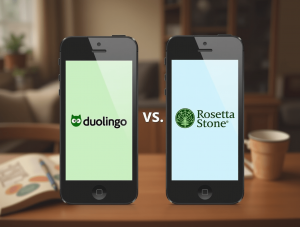
Which Online Learning Platform is Best for Your Educational Journey?
Did you know that over 90% of organizations now value online certificates almost as much as traditional degrees when evaluating job candidates? As remote learning continues to revolutionize education, platforms like Udemy and Coursera have become critical pathways to career advancement and skill development. But with thousands of dollars and countless hours potentially at stake, choosing the wrong platform could mean wasted time, money, and missed opportunities.
The dilemma extends beyond simple price comparisons—each platform offers fundamentally different learning experiences, credential values, and educational philosophies. By the end of this comprehensive guide, you’ll understand exactly how these platforms differ and which one aligns with your specific learning goals, budget constraints, and career aspirations.
Understanding the Core Differences
What is Udemy?
Udemy operates as an open marketplace where virtually anyone can create and publish courses. Founded in 2010, the platform hosts over 185,000 courses taught by more than 65,000 instructors in 75+ languages. This marketplace model has made Udemy one of the largest repositories of online courses available today.
Udemy’s approach prioritizes:
- Individual course purchases (rather than subscriptions, though subscription options exist)
- Practical, skill-focused training
- Frequent sales and promotional pricing
- Immediate access to course content upon purchase
- Instructor-driven content creation with minimal standardization
What is Coursera?
Coursera, founded in 2012 by Stanford professors Andrew Ng and Daphne Koller, functions as a curated platform partnering with established universities and corporations. The platform offers over 7,000 courses, degree programs, and professional certificates from institutions like Yale, Google, IBM, and approximately 275 university and industry partners.
Coursera’s approach emphasizes:
- Academic rigor and structured learning pathways
- Credential value through university and industry partnerships
- Subscription-based and individual course enrollment options
- Cohort-based learning with session start dates for many courses
- Standardized quality across courses with academic oversight
Course Quality and Content Structure
Udemy’s Course Quality Assessment
Due to Udemy’s open marketplace model, course quality varies significantly. The platform employs a five-star rating system and student reviews to help learners identify high-quality offerings, but these measures aren’t always reliable indicators of educational value. Some observations about Udemy’s quality:
- Instructor Qualifications: Range from industry professionals with decades of experience to enthusiastic beginners with limited teaching background
- Content Review Process: Minimal oversight compared to academic institutions
- Quality Control: Primarily market-driven—low-quality courses generally receive poor reviews and sink in search rankings
- Content Consistency: Highly variable formatting, pacing, and production quality between courses
According to an analysis of 1,000 top Udemy courses in 2024, the average instructor has 8+ years of practical experience but only about 40% have formal teaching credentials.
Coursera’s Course Quality Assessment
Coursera maintains higher baseline quality standards through its university partnerships. Courses typically follow academic models with these characteristics:
- Instructor Qualifications: Predominantly university professors and recognized industry experts
- Content Review Process: Subject to university quality standards and peer review
- Quality Control: Institutional reputation at stake, leading to more consistent standards
- Content Consistency: Standardized formatting, clearly defined learning objectives, and consistent assessment methods
A comprehensive study by Class Central found that Coursera courses maintain an average completion rate of around 15% (significantly higher than the industry average of 3-6%), suggesting better engagement and perceived value.
Learning Experience Comparison
The Udemy Learning Experience
Udemy’s learning approach emphasizes flexibility and immediate access:
- Course Structure: Most courses consist of video lectures, supplementary resources, and occasional quizzes
- Interactivity: Largely passive learning with limited peer interaction
- Support: Instructor Q&A forums with response times varying widely between courses
- Accessibility: Lifetime access to purchased courses with no deadlines
- Learning Community: Minimal cohort experience; students work independently at their own pace
The typical Udemy course contains 5-15 hours of video content, frequently broken into short, topic-specific segments ideal for targeted skill acquisition.
The Coursera Learning Experience
Coursera offers a more structured academic experience:
- Course Structure: Weekly modules with video lectures, readings, peer-reviewed assignments, and graded assessments
- Interactivity: Discussion forums moderated by teaching assistants, peer review systems, and occasional live sessions
- Support: Teaching assistants, peer support, and more standardized help systems
- Accessibility: Deadline-driven coursework with the option to reset deadlines; subscription provides ongoing access
- Learning Community: Cohort-based learning with opportunities for peer interaction
Coursera courses typically require 3-8 hours per week over 4-12 weeks, creating a more immersive and comprehensive learning journey with progressive skill building.
Pricing Models and Value Analysis
Udemy’s Pricing Structure
Udemy utilizes a primarily à la carte pricing model:
- Individual Course Purchases: Regular prices range from $19.99 to $199.99 per course
- Frequent Sales: Courses regularly discounted to $9.99-$19.99 during promotions (occurring approximately every 2-3 weeks)
- Udemy Business: Subscription option for organizations at $360/user/year
- Udemy Personal: Monthly subscription plan at $29.99/month for access to 8,000+ selected courses
- Refund Policy: 30-day money-back guarantee on most courses
The strategic Udemy buyer waits for sales, potentially acquiring courses at 80-95% discounts from list prices.
Coursera’s Pricing Structure
Coursera offers multiple pricing tiers:
- Individual Course Enrollment: $49-$99 per course (audit option available for free without certification)
- Coursera Plus: $59/month or $399/year for unlimited access to most courses and certificates
- Specializations: $39-$89 monthly subscription for multi-course programs
- Professional Certificates: $39-$99 monthly subscription until completion
- Online Degrees: $15,000-$45,000 for full master’s programs
- Financial Aid: Available for many courses and programs through application
According to Coursera’s 2024 Learner Outcomes Report, the average learner who earns a professional certificate reports a salary increase of approximately 13% within six months.
Credential Value and Recognition
Udemy Certificate Value
Udemy provides completion certificates for most courses, but these have limited recognition in formal educational contexts:
- Industry Recognition: Varying acceptance depending on employer and industry
- Accreditation Status: Not accredited by educational authorities
- Resume Value: Best positioned as supplementary skill development rather than primary credentials
- Verification System: Basic digital certificates without sophisticated verification systems
Udemy certificates demonstrate self-motivation and specific skill acquisition but generally carry less weight than accredited credentials.
Coursera Certificate Value
Coursera offers several credential types with different levels of recognition:
- Course Certificates: Verified digital credentials from the issuing university or company
- Professional Certificates: Industry-recognized credentials from companies like Google, IBM, and Meta
- MasterTrack Certificates: Portions of master’s programs that can count toward full degrees
- Degrees: Fully accredited bachelor’s and master’s degrees from partner universities
- Verification System: Secure digital verification with blockchain technology integration
A 2024 survey of 500 HR professionals indicated that 76% viewed Coursera certificates favorably during hiring processes, with Google, IBM, and university-backed certificates receiving the highest ratings.
Subject Matter and Specialization
Udemy Subject Coverage
Udemy excels in practical skills training with particular strengths in:
- Technology: Programming, web development, data science
- Business: Entrepreneurship, marketing, personal finance
- Creative: Design, photography, music
- Personal Development: Productivity, health, psychology
- Emerging Skills: Often covers trending topics faster than traditional education
The platform’s marketplace model allows it to rapidly expand into new subject areas, with approximately 5,000 new courses added monthly.
Coursera Subject Coverage
Coursera’s academic partnerships produce stronger offerings in:
- Academic Disciplines: Data science, computer science, business, humanities
- Professional Fields: Healthcare, engineering, education
- Corporate Training: Leadership, digital marketing, project management
- Research Methods: Statistics, scientific approaches
- Interdisciplinary Studies: Sustainability, global health, public policy
Coursera’s content development cycle is slower but results in more comprehensive coverage of fundamental principles and theoretical frameworks.
User Interface and Technical Experience
Udemy’s Platform Experience
Udemy’s platform provides a straightforward learning experience:
- Course Dashboard: Clean interface showing progress tracking
- Mobile Experience: Well-designed app allowing offline viewing of downloaded content
- Video Player: Basic functionality with speed control and closed captioning
- Note-taking Features: Simple bookmarking and notes system
- Search Functionality: Category-based browsing with recommendation algorithms
According to user experience studies, learners spend an average of 75 minutes per session on Udemy, primarily through the mobile app (63% of total usage).
Coursera’s Platform Experience
Coursera offers a more robust technical platform:
- Course Dashboard: Comprehensive progress tracking with deadline reminders
- Mobile Experience: Full-featured app supporting most course functions
- Video Player: Advanced features including interactive transcripts
- Note-taking Features: Integrated note system with timestamp linking
- Search Functionality: Sophisticated filtering by institution, difficulty level, and duration
Coursera’s platform is designed to support academic integrity, including features like proctored exams and plagiarism detection for graded assignments.
Instructor Quality and Teaching Approach
Udemy Instructor Analysis
Udemy’s open instructor model creates a diverse teaching landscape:
- Instructor Backgrounds: Industry professionals, entrepreneurs, subject enthusiasts
- Teaching Methodology: Tends toward practical demonstrations and project-based learning
- Instructor Support: Limited platform requirements for pedagogical training
- Content Updates: Varying commitment to course maintenance and updates
- Student Interaction: Instructor-dependent engagement levels in Q&A forums
Top-performing Udemy instructors (those with 100,000+ students) report earning average annual incomes of $100,000+ through the platform, incentivizing high-quality content creation and student support.
Coursera Instructor Analysis
Coursera’s instructors come primarily from academic and corporate backgrounds:
- Instructor Backgrounds: University professors, researchers, corporate training experts
- Teaching Methodology: Structured curriculum design with defined learning objectives
- Instructor Support: Institutional resources for course development
- Content Updates: More systematic review and refreshing of content
- Student Interaction: Teaching assistants often manage day-to-day student engagement
The typical Coursera course is developed by a team of 3-7 people over 4-8 months, representing a significant investment in content quality.
Which Platform Is Right For You?
Choose Udemy If:
- You’re seeking specific practical skills with immediate application
- Budget is a primary concern (especially if purchasing during sales)
- You prefer self-paced learning without deadlines or pressure
- You’re interested in niche topics or emerging fields
- You value lifetime access to content for future reference
- You’re motivated by concrete projects rather than theoretical foundations
Choose Coursera If:
- Credential recognition by employers or academic institutions matters to you
- You benefit from structured learning environments with deadlines
- You prefer courses developed by established educational institutions
- You’re working toward a comprehensive understanding of a field
- You value peer interaction and feedback on assignments
- You’re considering eventually pursuing a formal degree
- You want to build a coherent learning pathway with related courses
Conclusion
The Udemy versus Coursera decision ultimately hinges on your personal learning style, professional goals, and educational priorities. Udemy delivers exceptional value for practical skill acquisition in a flexible format, making it ideal for self-directed learners focused on specific competencies with immediate application.
Coursera provides a more traditional academic experience with stronger credentials and structured pathways, making it the superior choice for those seeking comprehensive knowledge frameworks and formally recognized qualifications.
For the dedicated lifelong learner, these platforms can actually complement each other—Udemy for quick skill acquisition and Coursera for deeper academic exploration. Many professionals strategically use both: Coursera for fundamental credentials and structured understanding, supplemented by targeted Udemy courses for specific technical skills or software proficiency.
Whichever platform you choose, online learning has fundamentally democratized education, offering unprecedented access to knowledge that was once confined to traditional institutions. The most important factor in your success won’t be the platform itself, but rather your commitment to applying what you learn.
FAQ Section
Can I get university credit for Udemy courses?
No, Udemy courses do not offer transferable academic credit. They are designed primarily for skill development rather than academic advancement.
Does Coursera offer any free courses?
Yes, Coursera allows you to audit many courses for free, giving access to video lectures and readings but without graded assignments or certificates. Additionally, they offer financial aid for learners who cannot afford course fees.
How do employers view certificates from these platforms?
Employer recognition varies significantly by industry and company. Coursera certificates, especially those from recognized universities or companies like Google, generally carry more formal weight. Udemy certificates are typically viewed as demonstrations of initiative and specific skill acquisition.
Can I download courses for offline viewing?
Both platforms offer offline viewing through their mobile apps. Udemy allows download of both video and supplementary materials, while Coursera’s offline functionality is more limited to video content.
What happens if I’m unsatisfied with a course?
Udemy offers a 30-day money-back guarantee for most courses. Coursera’s refund policy varies by product, with most courses offering full refunds within 14 days of payment or within 14 days of the course starting, whichever is later.
Are there any hidden costs on either platform?
Udemy courses are generally one-time purchases with no additional fees. Coursera’s subscription models are straightforward, but some specializations or courses may require additional materials not included in the base price.














